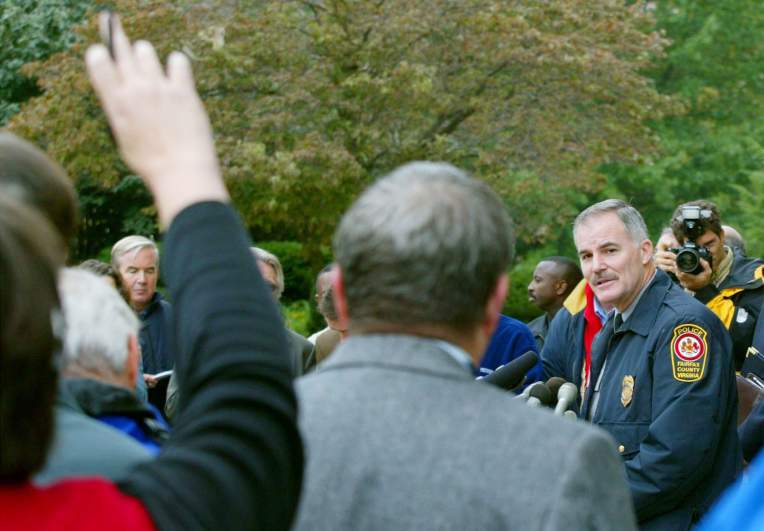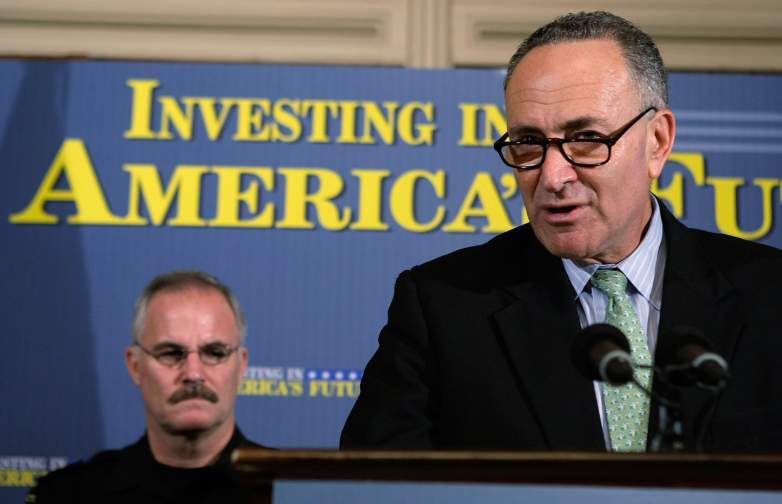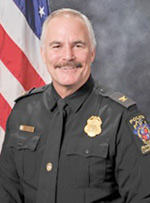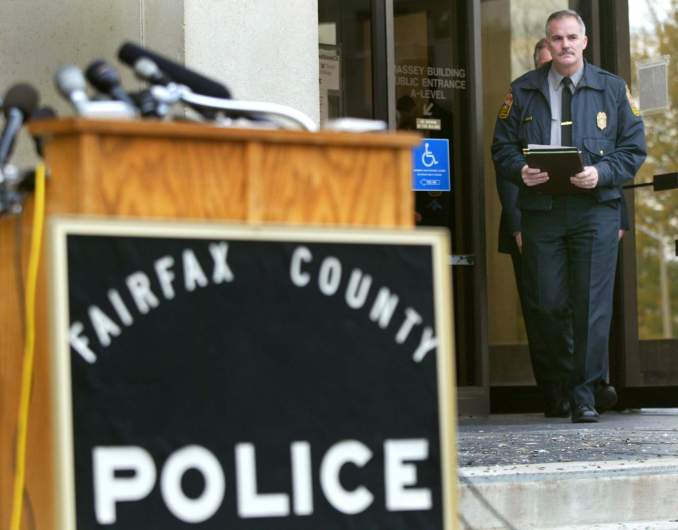
Getty Tom Manger
Tom Manger, the police chief of Montgomery County, Maryland, says that his office is willing to investigate Christine Blasey Ford’s accusation against Supreme Court nominee Brett Kavanaugh – if he gets a complaint.
“We are prepared to investigate if the victim wants to report to us, and we can determine it occurred in the County,” Manger said in a statement, according to journalist Brian Karem. (Maryland’s Republican governor has said Maryland State Police won’t investigate.)
Manger’s willingness to wade into one of the most contentious stories of the year has some people wondering more about his biography.
Here’s what you need to know:
1. Manger Has Been Montgomery County Police Chief Since 2004 & Is Present of a Major Cities Chiefs’ Organization

Tom Manger
Manger has been the police chief in Montgomery County, Maryland for almost 14 years.
Chief J. Thomas Manger was “sworn in as Montgomery County Police Chief on January 30, 2004,” according to a biography of him on the website of the Major Cities Chiefs Association, a prominent national organization of which he is president.
“The Montgomery County Department of Police (MCP) is one of the largest police departments in the State of Maryland, with more than 1300 sworn and 550 civilian members serving 1 million residents in the greater Washington D.C. Metropolitan Area,”‘ the bio says.
In April 2018, Manger spoke at an event for National Sexual Assault Awareness Week and reported that, in 2017, his office handled 1,500 sexual assault-related investigations, according to DCW50.
“Here’s what those numbers don’t represent, it represents the hundreds and hundreds of cases in this county that were never reported,” he said, according to the television station. “We recognize that there is still a great deal of work to do and that’s why nights like tonight are so important.”
The accusation in the Ford/Kavanaugh case is 36-years-old and dates to when Kavanaugh was 17, a juvenile. That has some wondering: Could it even be prosecuted? What is the statute of limitations for sexual assault in Maryland? It turns out that the severity of the offense dictates that and that would be a determination by prosecutors; according to Legal Match, “In Maryland, the criminal statute of limitations varies depending on the severity of the offense. The criminal statutes of limitations include: Felony sexual offenses: no statute of limitations, and Misdemeanor offenses: one year from the event.” Christine Blasey Ford has accused Kavanaugh of attempted sexual assault, alleging he groped her and put his hand over her mouth but says she was able to get away. Kavanaugh denies the accusations, as does another man whom Ford alleges was in the room at the time.
The analysis would be complicated potentially by Kavanaugh’s age at the time; what the statute of limitations was at the time of the alleged offense in Maryland; and, as noted, a prosecutor’s determination of the level of seriousness of offense. RAINN.org says the “the state has eliminated the statute of limitations for all felony sex crimes” and whether the accuser reported the allegation at the time does not affect the statute of limitations. Maryland’s current laws treat juveniles different than adults if they are under age 18 at the time they’re prosecuted.
The Washington Post reports that Maryland’s laws would seem to “preclude charges” in the Kavanaugh case – at least according to one legal expert they spoke to. A Maryland attorney who specializes in sex crimes said the accusations, as described to The Post, appear to constitute misdemeanors.
Lisae Jordan, the executive director and counsel for the Maryland Coalition Against Sexual Assault, said, though, that if the allegations rose to the level of second-degree rape or an attempted second-degree sexual offense, those would be felonies, but she added to Examiner that it is “very difficult to assess whether the actions rise to the level of an attempt given the limited facts we have.”
Randolph Rice, a Maryland criminal defense attorney, told Examiner, “I just don’t see how you get to an attempted felony. There was no allegation of a weapon, so not first-degree rape. There was no allegation there was force or he attempted to have vaginal intercourse. That’s a stretch, I think, for any prosecutor if they looked at this case.” Any prosecution would also be compounded by the age of the case, including witness memories and lack of some key details (Blasey Ford has not been clear on where the alleged attack exactly occurred, although she says it was in Montgomery County, Maryland.)
2. Tom Manger Is a Maryland Native Who Has Been in Policing Since the 1970s

U.S. Sen. Charles Schumer (D-NY) (R) as Police Chief of Montgomery County of Maryland J. Tom Manger (L) listens during a news conference October 24, 2007 on Capitol Hill in Washington, DC. Schumer and Senate Majority Leader Sen. Harry Reid (D-NV) held a news conference to discuss the several appropriations bills that President George W. Bush has threaten to veto.
The bio for Tom Manger describes him as a Maryland native, who “graduated from the University of Maryland in 1976 with a B.A. in Criminal Justice. Chief Manger began his law enforcement career in 1977 with the Fairfax County (Virginia) Police Department. He rose through the ranks to become Chief of Police in 1998.”
During his tenure in Fairfax County, “Chief Manger received numerous awards including the Silver Medal of Valor,” the bio continues. “Chief Manger is credited with reorganizing and expanding the Fairfax County Police Department’s community policing efforts.”
Manger has received accolades from human rights groups. “His commitment to the highest ethical standards for policing and his enactment of new policies to increase departmental accountability earned significant recognition from the community, to include the Fairfax County Human Rights Commission Award for outstanding contributions, and the N.A.A.C.P.’s Community Service Leadership award. In 2012, Chief Manger was inducted into the Montgomery County Human Rights Hall of Fame,” says his bio.
3. Manger Is Involved in Other National Policing Organizations

Tom Manger
Manger is connected to organizations on the national level that deal with policing issues.
“In addition to being the President of the Major Cities Chiefs Association, Chief Manger also serves as the Vice-President on the Board of Directors for the Police Executive Research Forum (PERF). Chief Manger is a graduate of the F.B.I. National Academy, the National Executive Institute, the Police Executive Leadership School at the University of Richmond, and the Senior Executive Institute at the University of Virginia,” his bio reads.
“In 2006, Chief Manger completed the John F. Kennedy School’s Program for State and Local government, at Harvard University.”
4. Manger Criticized President Donald Trump in a Letter to The Washington Post
Tom Manger once authored a letter to The Washington Post that criticized Trump. He wrote in part:
“Our job got tougher last Friday. As a cop for the past 40 years, I was appalled when I heard President Trump condone injuring an individual in police custody [“Fire from four corners friendly to President Trump,” The Sunday Take, July 30]. This violates the Constitution, department policy and the public trust. While any elected official can give his or her views on how the police should do their jobs, it is the actions of police officers that speak directly to who we are. Applause from police for those remarks confirmed to those who don’t like or trust the police that we give a wink and a nod to excessive force. We don’t. My hope is that the officers at Friday’s event felt an awkward duty to laugh at Mr. Trump’s inappropriate comments.” You can read the full letter here.
The Post article that the letter linked to had reported that “Trump spoke on Long Island about efforts to combat gang warfare. He offered police some advice — not to treat suspects so gingerly. He suggested that, when putting suspects into the back of a police cruiser, officers should not take precautions to protect the suspect from physical harm.”
Manger later spoke about the letter on video to a local news outlet. You can watch that interview above.
“I was very dismayed with what I heard and even it was a joke, I think in this day and age and with what my cops go through every day, I didn’t find it funny,” he said in the video interview. “That letter was not to President Trump. That letter was to the residents of Montgomery County and it was to the American public. To remind them of the service and sacrifice that cops do every day…we take our job seriously and we know how to do it right.”
He added, “Every police officer I’ve spoken with…was dismayed at the president’s remarks.”
5. Manger Has Spoken Out on Immigration Issues

Manger, back when he was with Fairfax County
In June 2018, Manger spoke out as president of the Major Cities Chiefs Association, saying he was opposed to detention of families awaiting immigration hearings.
The Voice of America reported that Manger was one of a series of law enforcement officials to voice their “concerns about President Donald Trump’s executive order to ‘strip’ federal grant money from sanctuary states and cities that harbor undocumented immigrants,” quoting Manger as saying, “We are concerned about this threat of losing funds.”
In 2017, Manger spoke before the Senate Committee on Homeland Security and Governmental Affairs, saying in part, in reference to immigrant gang activity, such as MS-13, “Mr. Chairman, when President Trump spoke at the Washington conference of Major Cities Chiefs, on the same day you joined us, the President said, ‘I am asking you to help us get the really bad ones.’ Well, that is exactly what we are doing in partnership with ICE and that is why I appear before you today. But it is vital for the Committee to understand that we cannot get the ‘really bad ones’ without the help and support of immigrants who have not committed crimes in our communities.”
He continued, “Without the cooperation of immigrants who have not committed crimes, we would never be able to find and arrest MS 13 criminals. This is a key example of why Chiefs in major cities across the Nation do not engage in routine, civil immigration enforcement.” You can read his full testimony here.

